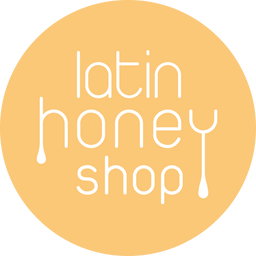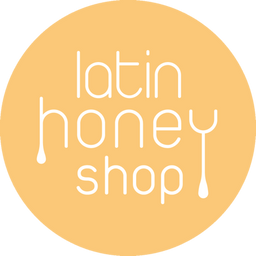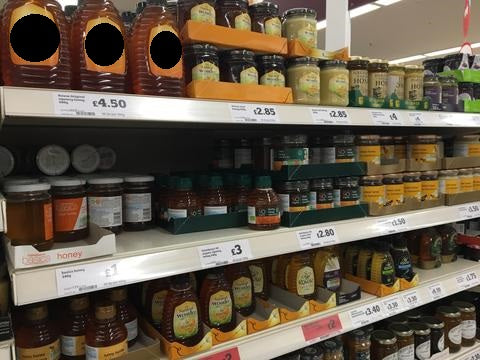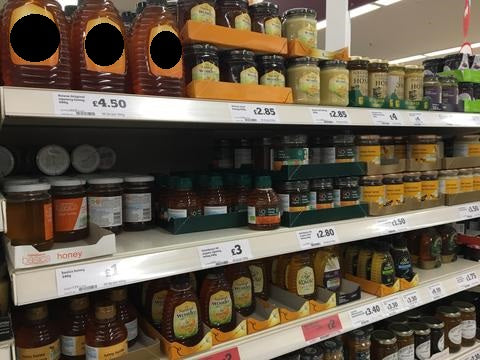
Consumers in the United Kingdom get through around 43,000 tonnes of honey every year. 95% of this honey is imported from outside the UK.
Most of the honey consumed in the United Kingdom is what is known as "supermarket honey", in other words, honey that has been processed.
Here are 11 quick facts about supermarket honey that most people are unaware of:
1) Supermarket honey is not actually honey
Supermarket honey is filtered in a process which removes most, if not all, of its pollen. The removal of pollen from honey makes it impossible to determine its botanical origin, or whether is it even honey.
A 2011 survey by Food Safety News on 60 different supermarket honeys in the United States found that 76% had no pollen at all. Most supermarket honey in the US is the same as that supplied to supermarkets in the UK.
Honey without pollen is not honey, it's just a honey-flavoured sugary syrup.
2) Supermarket honey is not labelled with a country of origin because it does not have a country of origin
The labels of most supermarket honey sold in the UK are marked, "Blend of EC/non-EC honeys." Such a vague description is proof that the honey contains little, if any, pollen.
If the honey contained pollen, then its geographical origin would be traceable and known and its country of origin would be marked on the label.
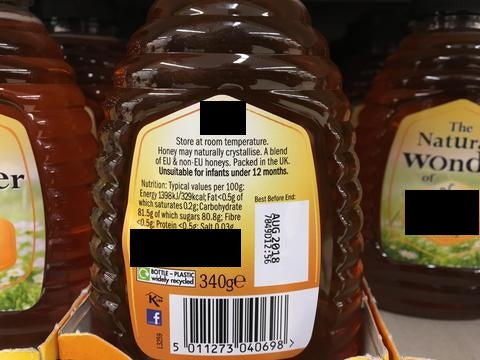
3) Supermarket honey does not crystallise or is slow to crystallise
The more pollen that a honey contains, the more nutrients and benefits it contains. Raw honey crystallises quickly because its pollen has not been filtered out.
When raw honey crystallises, it does so quickly because its glucose has pollen particles that it can attach to.
4) Supermarket honey is dead and has no living, beneficial nutrients in it
Honey starts its life as a living product which contains living nutrients, beneficial bacteria and enzymes. It is these nutrients that provide all the powerful health benefits of honey.
These living nutrients can only survive up to a maximum hive temperature of 37C-40C/99F-104F. Above this temperature, they die.
In order to prevent supermarket honey from crystallising, processors heat the honey up to 75C/160F.
This process certainly delays the crystallisation process, but it also kills every beneficial living nutrient in the honey. Dead honey has no health benefits beyond providing a sugar rush.
On the other hand, raw honey is "cold pressed", meaning that the honey is never warmed to above 37C-40C/99F-104F when it is filled into jars.
5) Supermarket honey has a history of being contaminated with harmful antibiotics
Most processed honey sold in Europe is cheap honey imported from China. Chinese honey has a dark history of being contaminated with banned antibiotics that can be fatal to humans.
In February 2002, the EU banned Chinese honey after it was found to be contaminated with chloramphenicol, a banned antibiotic that can cause a fatal blood condition, aplastic anaemia, in humans.
This led to an urgent recall of supermarket honey from supermarkets shelves across the UK.
Supermarket honey from many famous UK brands tested positive for at least one banned antibiotic so they were immediately withdrawn.
6) Processed honey is frequently honey that has been subject to "honey laundering"
During the 2002-04 Chinese honey ban in the EU, some Chinese honey producers got round the ban by re-exporting their contaminated honey through third countries such as India and changing the country of origin on the export documentation.
Honey laundering continues even today. Honey from countries unauthorised to export honey to the EU is being sold in the UK after having been "laundered" through different countries.
7) Supermarket honey has no aroma
It smells the same because it usually is the same. Most supermarket honey sold in the UK is processed and bottled by the same small number of honey factories.
In other words, one or two honey factories supply exactly the same honey which is sold in different supermarkets under different name brands.
On the other hand, raw honey has a variety of aromas depending on the botanical origin of the honey. Rose, vanilla, sandalwood, butterscotch... are all aromas that are present in different varieties of raw honey.
8) There are no beneficial "bits" in supermarket honey
The mass market supermarket honey industry has got consumers used to wanting their honey as a clean, clear liquid. A clean, clear, scentless liquid is a sign of processed honey which has little or no health benefits.
Raw, real honey contains a number of particles which contain an immense number of health benefits. These particles include propolis, royal jelly and pollen, which provide honey with all its antibacterial, antifungal and antiviral properties.
In other words, the "bits" present in raw honey indicate that it is raw and unfiltered.
9) Supermarket honey is more likely to be contaminated with artificial glucose, high fructose corn syrup and other artificial sweeteners
Bees in mass market honey hives are frequently fed sugar solution or high fructose corn syrup to speed up the honey production process. In other words, supermarket honey is often likely to be nothing more than sugar solution regurgitated through bees.
10) Supermarket honey is usually the same colour because it is the same honey
Have you ever wondered why runny supermarket honey with exotic sounding labels: clover honey, acacia honey, etc. usually looks the same?
It is because it normally is the same thing. Mass market honey factories simply make minor changes to percentages of the different processed honeys to produce different "flavours" of supermarket honey.
On the other hand, raw honey comes in colours ranging from black, dark red and amber to amber, yellow and white (yes, white!).
11) Processed honey brings more harm than benefit
Many consumers eat supermarket honey thinking that they are consuming one of the healthiest natural substances known to man. This false sense of belief leads them to eat more honey, blissfully unaware that they are simply eating large quantities of sugar in liquid.
So if you want to eat honey, make sure that it is raw and unfiltered.
Put another way, if you are feeding your body supermarket honey, you may as well eat white sugar in water, because it is cheaper and quicker to obtain. (And it is less likely to contain harmful antibiotics.)
